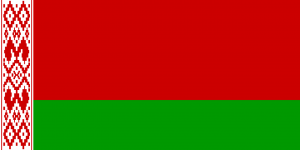Difference between revisions of "Language/Belarusian/Vocabulary/Numbers-and-Time"
m (Quick edit) |
m (Quick edit) |
||
| Line 103: | Line 103: | ||
* [[Language/Belarusian/Vocabulary/Fruits|Fruits]] | * [[Language/Belarusian/Vocabulary/Fruits|Fruits]] | ||
* [[Language/Belarusian/Vocabulary/Family-Events|Family Events]] | * [[Language/Belarusian/Vocabulary/Family-Events|Family Events]] | ||
<span class='maj'></span> | |||
==Sources== | |||
* [https://en.wikipedia.org/wiki/Belarusian_language Belarusian language - Wikipedia] | |||
* [https://www.lingo-play.com/en/learn-belarusian-online/ Belarusian online - Learn Belarusian langauge online with LinGo Play] | |||
* [https://en.wikipedia.org/wiki/The_First_Belarusian_Dictionary_by_Ivan_Nasovi%C4%8D The First Belarusian Dictionary by Ivan Nasovič - Wikipedia] | |||
{{Belarusian-Page-Bottom}} | {{Belarusian-Page-Bottom}} | ||
Revision as of 22:12, 14 March 2023
As a native Belarusian speaker and language teacher with 20 years of experience, I'm excited to introduce you to the Belarusian language. In our lesson today, we'll cover basic numbers and telling time in Belarusian. It's essential to grasp fundamental concepts to build a strong foundation in the language, so let's get started.
Counting in Belarusian
Belarusian uses a system similar to many other Slavic languages, featuring the Cyrillic alphabet. When counting in Belarusian, there are a few hard-to-pronounce consonants and intonation to consider as well. Attached below is the table of numbers from 1-20 in Belarusian.
| Belarusian | Pronunciation | English |
|---|---|---|
| адзін | ah-DZIN | one |
| два | dva | two |
| тры | try | three |
| чатыры | cha-TY-ry | four |
| пяць | pyats | five |
| шэсць | shes-tsyn | six |
| сем | syem | seven |
| восем | vah-SEM | eight |
| дзевяць | dzye-VYATS | nine |
| дзесяць | dzye-SYATS | ten |
| адзінаццаць | ah-DZEE-na-tsats | eleven |
| дванаццаць | dvah-na-tsats | twelve |
| трынаццаць | try-na-tsats | thirteen |
| чатырнаццаць | cha-TYR-na-tsats | fourteen |
| пятнаццаць | pyat-na-tsats | fifteen |
| шаснаццаць | shas-na-tsats | sixteen |
| семнаццаць | syem-na-tsats | seventeen |
| васімнаццаць | va-SIM-na-tsats | eighteen |
| дзевятнаццаць | dzye-VYAT-na-tsats | nineteen |
| дваццаць | dvats-tsats | twenty |
It's worth noting that the word for "one" changes when describing masculine and feminine nouns. For example, "Adzіn chalavek" means "one man", while "Adzіna kniha" means "one book."
Once you've mastered numbers up to 20, counting higher is a breeze. Belarusian also uses a base 10 system, so be sure to remember the word for 10(дзесяць), 100(сто), and 1000(тысяча).
Telling Time in Belarusian
Telling time in Belarusian is also straightforward. Here's a brief example of how to express the time in Belarusian, including some examples.
| Belarusian | Pronunciation | English |
|---|---|---|
| Колькі гадзін? | kohl-KEE GA-dzeen? | What time? |
| Гэта другая гадзіна. | GEA-ta DRU-ha-ya GA-dzeen-a | It's two o'clock. (Literally: "It's the second hour.") |
| Гэта паў на шостую. | GEA-ta POW na SHOS-tsu-yu | It's half past six. ("It's half on the seventh.") |
| Гэта дзесяць хвілін на дзьве. | GEA-ta dzye-SYATS hvil-EE-nan dzvye | It's ten minutes to two. ("It's ten minutes on two.") |
You'll need to get used to the numbers, but the intonation is also vital to notice. Remember, it's a good idea to practice like a native speaker; try to ask, "Kolki hadzin?" (колькі гадзін?) instead of the literal English translation.
Conclusion
Congratulations! You've just learned the basic numbers and time in Belarusian. Keep practicing numbers up to 20, and don't forget the words for 10,100, and 1000. Telling time is a relatively straightforward concept, and with enough practice, you'll be able to speak like a native speaker in no time.
Related Lessons
- Public Transportation
- Body and Medecine
- Health
- Months of the year
- Introducing Yourself
- Geography
- Idiomatic Expressions
- Fruits
- Family Events
Sources
- Belarusian language - Wikipedia
- Belarusian online - Learn Belarusian langauge online with LinGo Play
- The First Belarusian Dictionary by Ivan Nasovič - Wikipedia
